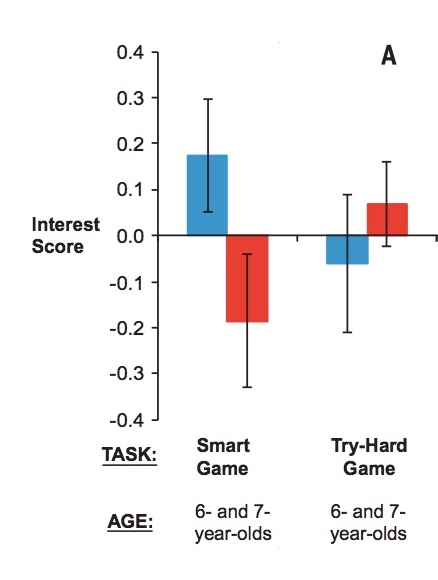At some point during our upbringing, the stereotype that men are more intelligent than women is likely to set in.
Even though I do not believe it, I do not accept it and I certainly do not condone it, I can see that this stereotype exists.
Like most stereotypes, it is extremely powerful despite being false. One of the many negative outcomes of this stereotype is that it guides girls' choices and behaviors, resulting in, for one, the lack of women in fields where being perceived as brilliant is more important than other traits like hard work.
At what age does this stereotype take hold?
New research published in Science shows that children as young as 6 are already knee deep in sexism. Bian et al. asked 5, 6 and 7 year old boys and girls to complete three tasks in order to ascertain whether they endorsed the stereotype of “brilliance = males.”
The tasks were,
- Children were told a brief story about a person who was “really, really smart.” No hints as to the protagonist’s gender were provided. Children were then asked to guess which of four unfamiliar adults (two men, two women) was the protagonist of the story.
- Children saw several pairs of same- or different- gender adults and guessed which adult in each pair was “really, really smart.”
- Children completed three novel puzzles in which they had to guess which objects (e.g., a hammer) or attributes (e.g., smart) best corresponded to pictures of unfamiliar men and women.
All of the pictures depicting males and females were matched for attractiveness and professional dress which could potentially sway perceptions of intelligence.
In the figure below, the line represents the "own-gender brilliance score" - the extent to which one gender thinks that members of the same gender are, as children note, "really, really smart."
The age of the children is shown on the bottom of the graph. Boys' responses are noted in blue and girls' in red. The two sets of data (A and C) are repeats of the same experiment.
The first observation from the data is that children's ideas about gender and brilliance change drastically between the ages of 5 and 7. More specifically, 6 and 7 year-old girls are less likely than boys to believe that members of their own gender are “really, really smart.”

Another test (shown in the figure below) analyzed decisions that children make based on two different types of activities.
Sixty-four children aged 6 and 7 (half boys, half girls) were introduced to two novel games. The children were told that one game was for “children who are really, really smart” and the other for “children who try really, really hard." Children were then asked four questions to measure their interest in these games.
The result was that girls were less interested than boys in the game for smart children but not in the game for hard-working children. These results are seen below. Again, boys are in blue and girls in red.

The take home message here is that girls, by age six, do two different things related to their gender. First, they lump more boys into the “really, really smart” category. Second, they steer away from games intended for “really, really smart” people.
The reasons why 5 and 6 year old girls have such different perceptions is unknown. Perhaps it is the start of school and the pressures of the classroom? In order to understand the root of the issue, more research has to be done. In the meantime, perhaps we should stop bombarding young girls with messages about them being sugar and spice and everything nice and instead help inspire self-confidence in their intelligence.
Source: Lin Bian. Gender stereotypes about intellectual ability emerge early and influence children’s interests. Science 27 Jan 2017: Vol. 355, Issue 6323, pp. 389-391 DOI: 10.1126/science.aah6524




